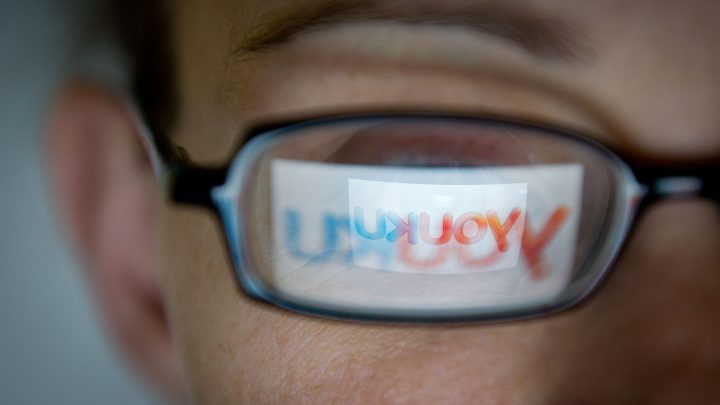
What Chinese streaming services censor from American TV shows
What Chinese streaming services censor from American TV shows

Around 70 cities in China — including economic centers like Shanghai, Shenzhen and Chengdu — are in full or partial antivirus lockdowns. Policymakers in Beijing are sticking to their zero-COVID policy, despite the economic repercussions.
For those outside China, it can be hard to understand just how much control the government has over daily life. Take television censorship. Back in 2014, a handful of American shows, including the CBS sitcom “The Big Bang Theory,” abruptly disappeared from Chinese streaming services, only to return more than a year later with some of their content removed.
In a recent analysis for “The Pudding,” data journalist Manyun (Mandy) Zou watched 100 episodes of “The Big Bang Theory” on a Chinese streaming service side by side with their U.S. versions to figure out what, exactly, was censored. Zou discussed what she learned from that experiment with “Marketplace” host Kai Ryssdal. The following is an edited transcript of their conversation.
Kai Ryssdal: So tell me, first of all, how you became a fan of “The Big Bang Theory.”
Manyun Zou: So, “The Big Bang Theory” is one of the American TV show that I’ve been watching since high school. It’s kind of my go-to show whenever I feel stressed out — and I’m the kind of person who constantly feels stressed out (laughter). And I ended up watching the show over and over again.
Ryssdal: Yeah, I’ve been there, and with “The Big Bang Theory” as well. And I should say — just so everybody knows — I’m a huge fan of “The Big Bang Theory” as well, but tell me about what you did, and then I want to talk about what you found.
Zou: Sure. So I was watching the show earlier this year on Youku, which is one of the biggest streaming websites in China that was backed by Alibaba, the e-commerce giant. And I noticed that there are some weird jumps and cuts in the show. I don’t want to be, like, paranoid or crazy, so I sat down, watched the censored version — which is the Youku version — and the original version, side by side. I took notes, put together a spreadsheet [with] notes, including how many things are cut and what’s the content.
Ryssdal: You know, it’s funny because “The Big Bang Theory” is one of the most innocuous sitcoms. I mean, it’s got a laugh track, for crying out loud, and who does that nowadays? But there were certain types of content that you, you know, you did the data journalism thing, and you discovered that certain types of content basically always get cut. What were those categories?
Zou: Yeah. So sex is the most frequently censored topic in this TV show, which is TV-14. But yeah, any sexual content, like a mention of explicit body parts, or like, you know, verbs, like “have sex.” Also, anything related to LGBTQ identity, so like “gay,” “lesbian,” other things — all cut out. And any mention of “Russia” or “North Korea” or “China” gets cut out as well.
Ryssdal: So even outside those categories, though, there are some that are, you know, in my book, harmless. Let me run it by you, and we’ll see what you say. So let’s play the censored one of the orange chicken.
Ryssdal: And there’s the cut, right? You can hear the cut in the laugh track. Now, let’s play the version that actually aired here in the States.
A clip from the uncensored, U.S. version of “The Big Bang Theory.” (Captured by Manyun Zou)
Ryssdal: I mean, you know, that was kind of funny, don’t you think?
Zou: Yeah, I think so. Like, this is kind of the thing that I don’t get why those companies tried to cut those out. Because I mean, like, some people may argue that this kind of joke might imply that all these Chinese food restaurants are not good. But I mean, like, this — this is just, like, one specific Chinese restaurant in Los Angeles. You know, it doesn’t, like, represent all these Chinese restaurants.
Ryssdal: OK, so here comes the big Marketplace turn: China will be, at some point, the biggest economy in the world, right? It just will — given demographics, given industrial base, given all that stuff, right? And one of the things that happens when you’re the biggest economy in the world — as the United States has enjoyed for many a decade now — is that your cultural exports gain new relevance. And I guess my question is, what do you suppose this means for Chinese “soft power” and cultural exports as their economy grows in dominance?
Zou: China has been seeking to develop its soft power for many years. But meanwhile, I can feel that China, the Chinese government, is very serious about this censorship. Like, it cannot allow those content creators to have the space and the room to create, to shoot whatever they want. And if those content producers don’t have this creativity to make great works, then I don’t see how the soft power can be strong.
There’s a lot happening in the world. Through it all, Marketplace is here for you.
You rely on Marketplace to break down the world’s events and tell you how it affects you in a fact-based, approachable way. We rely on your financial support to keep making that possible.
Your donation today powers the independent journalism that you rely on. For just $5/month, you can help sustain Marketplace so we can keep reporting on the things that matter to you.

















